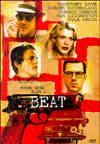Beat
Studio Home Entertainment (Sterling)
Cast: Kiefer Sutherland, Courtney Love, Ron Livingston, Norman Reedus
Extras: Commentary Track, Photo Gallery
Rating:
Drug addiction, madness, sexual obsession and beatific language represented the mantra of the writers of the Beat Generation. Their literary output aside, William S. Burroughs, Jack Kerouac, and Allen Ginsberg led such fascinating lives that it would be impossible to tell their individual or collective life stories and not have it be hallucinatory or at least compelling. Well, almost impossible.
In Gary Walkow’s biopic ’Beat,’ the focus is not on creation but on dissolution, specifically the crumbling marriage of Beat writer William S. Burroughs (Kiefer Sutherland) and Joan Vollmer (Courtney Love). Most of the story takes place in 1951 Mexico City, as Burroughs takes off with his lover for a trip to Guatemala, leaving Joan with the kids and a surprise visit by fellow Beat poet Allen Ginsberg (Ron Livingston) and friend Lucien Carr (Norman Reedus). Joan, Lucien and Allen take off to look at a dormant volcano and Burroughs meanders around the jungle, trying to find meaning in his trysts.
For a biopic about artists as influential as the Beats, the script seems more intent on painting the characters as failed domestics, not great writers. Most of the time we see Joan flirting with Lucien with Allen sadly watching from the sidelines or Burroughs pontificating on everything, but not in any particularly illuminating way. Based on true events, the film recreates the tragic ’William Tell’ incident in Burroughs’ life, immortalized in his watershed novel ’Naked Lunch.’ Despite being about one man who charted the landscape of the drugged-out mind and another whose bouts with mental illness inspired ’Howl,’ one of the seminal poems in American literature, the film ultimately lets down by trying to shoe-horn these larger than life figures inside the milieu of a bad soap opera.
If the narrative disappoints, the film’s look on DVD more than compensates. The 1.78 anamorphic transfer just sparkles with a smooth, ultra detailed picture. Color reproduction is superb, whether it’s noticing Joan’s blood-red lipstick or the lush green of the Mexican jungle. Details like the gloss on Joan’s nails or the textures on a sweater come through crisp and clear. Despite a few instances of pixelation, the image shows no digital or compression artifacts and, amazing given the level of picture detail, no edge enhancement.
Even though it’s mainly a character drama, the Dolby Digital stereo surround audio has a surprising amount of ambience to it. When called for, city or jungle noises chime in the soundtrack without becoming too distracting or muddying the dialogue, which comes across nice and clean. (A couple of times I noticed an ’echo’-like quality to the ADR. I tried playing the same scenes on two different playback systems and heard it to varying degrees each time, so I can’t make an absolute judgment regarding it.)
The extras consist of a commentary track by director/co-writer Walkow and co-editor Steve Vance and a still photo gallery of on-location shots. Walkow and Vance share their filmmaking travails and thematic intent with conviction, but unfortunately, it is in service to a film that loses the viewer long before we care about what happened behind the scenes.







